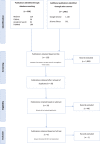Targeted temperature management in acute liver failure: A systematic review
- PMID: 32602249
- PMCID: PMC10078683
- DOI: 10.1111/nicc.12524
Targeted temperature management in acute liver failure: A systematic review
Abstract
Background: Targeted temperature management is the modern term for therapeutic hypothermia, where cooling is induced by intensive care clinicians to achieve body temperatures below 36°C. Its use in acute liver failure to improve refractory intracranial hypertension and patient outcomes is not supported by strong quality evidence.
Aim: This systematic review aims to determine if targeted temperature management improves patient outcome as opposed to normothermia in acute liver failure.
Methods: A computerized and systematic search of six academic and medical databases was conducted using the following keywords: "acute liver failure", "fulminant hepatic injury", "targeted temperature management", "therapeutic hypothermia", and "cooling". Broad criteria were applied to include all types of primary observational studies, from case reports to randomized controlled trials. Standardized tools were used throughout to critically appraise and extract data.
Findings: Nine studies published between 1999 and 2016 were included. Early observational studies suggest a benefit of targeted temperature management in the treatment of refractory intracranial hypertension and in survival. More recent controlled studies do not show such a benefit in the prevention of intracranial hypertension. All studies revealed that the incidence of coagulopathy is not higher in patients treated with targeted temperature management. There remains some uncertainty regarding the increased risk of infection and dysrhythmias. Heterogeneity was found between study types, design, sample sizes, and quality.
Conclusion: Although it does not significantly improve survival, targeted temperature management is efficient in treating episodes of intracranial hypertension and stabilizing an unstable critical care patient without increasing the risk of bleeding. It does not, however, prevent intracranial hypertension. Data heterogeneity may explain the contradictory findings.
Relevance to clinical practice: Controlled studies are needed to elucidate the true clinical benefit of targeted temperature management in improving patient outcome.
Keywords: acute liver failure; coagulopathy; intracranial hypertension; targeted temperature management; therapeutic hypothermia.
© 2020 The Authors. Nursing in Critical Care published by John Wiley & Sons Ltd on behalf of British Association of Critical Care Nurses.
Figures
References
-
- Wlodzimirow KA, Eslami S, Abu‐Hanna A, Nieuwoudt M, Chamuleau RAFM. Systematic review: acute liver failure—one disease, more than 40 definitions. Aliment Pharmacol Ther. 2012;35:1245‐1256. - PubMed
-
- Bernal W, Wendon J. Acute liver failure. N Engl J Med. 2013;369:2525‐2534. - PubMed
-
- Jalan R, Olde Damink SWM, Deutz NEP, Hayes PC, Lee A. Moderate hypothermia in patients with acute liver failure and uncontrolled intracranial hypertension. Gastroenterology. 2004;127:1338‐1346. - PubMed
Publication types
MeSH terms
LinkOut - more resources
Full Text Sources
Medical



